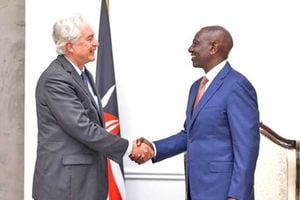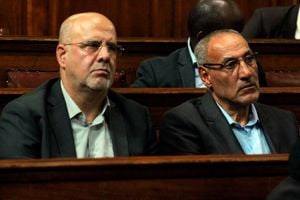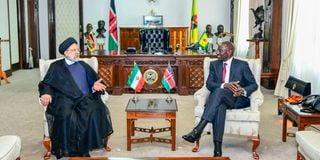
President William Ruto with Iranian President Ebrahim Raisi during the State Visit at State House, Nairobi on July 12, 2023.
Iranian President Ebrahim Raisi, who was killed in a helicopter crash on Sunday, had a highly publicised visit to Kenya last year that was clouded in diplomatic mishaps and condemnation by US officials.
The itinerary for the Iranian leader’s visit was changed at the last minute amid speculation of behind-the-scenes meddling by some of Kenya’s powerful partners, particularly the US, which has imposed heavy sanctions on Tehran on accusations of being a State-sponsor of terrorism.
However, Kenya’s Ministry of Foreign Affairs cited uncompleted agreements as the reason for the postponement, by a day, of the visit by President Raisi, who had been due to arrive in Kenya on July 11, 2023.
“The schedule of the president has now been reviewed to allow for finalisation of key MOUs that are central to the furtherance of relations. The Iranian president will now arrive tomorrow for a State visit,” the ministry said in the statement on July 11, 2023, which also sought to address questions about characterisation of the visit in diplomatic terms.
“The president will be at State House at 7am tomorrow for a bilateral meeting,” the statement added.
Eventually, the following day, Kenyan President William Ruto rolled out a red carpet reception for his controversial guest.
Memoranda of Understanding
But even with the delay, most of the Memoranda of Understanding (MOU) were never signed during the early morning bilateral talks between the two delegations.
“Five MoUs touching on expanded markets for Kenya’s livestock and tea, health, pharmaceuticals, ICT and a motor vehicle plant were signed and six others are to be signed at a later date,” said then Foreign Affairs Cabinet Secretary Alfred Mutua, who saw off the Iranian leader at Jomo Kenyatta International Airport (JKIA) as he headed to Uganda and Zimbabwe.
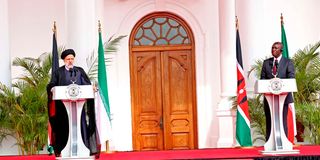
President William Ruto (right) and his Iranian counterpart Ebrahim Raisi during a press conference at State House, Nairobi on July 12, 2023.
The drama surrounding the visit attracted attention from international relations scholars.
“Hiccups around the visit of the President of Iran, Ebrahim Raisi, is a wake-up call to Kenya to anchor its foreign policy firmly on our national interests and the values of meritocracy, pragmatism and honesty,” Prof Peter Kagwanja posted on X, formerly Twitter, on July 12, 2023.
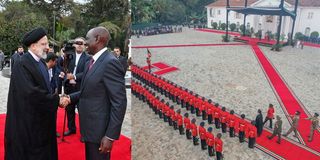
Photo combination of President William Ruto shaking hands with Iranian President Ebrahim Raisi and red carpet laid out out at State House in Nairobi, Kenya on July 12, 2023. PHOTO | PCS
Five days after the departure of the Iranian leader, Washington dispatched two key officials to Nairobi, and although the visits were scheduled, the messaging afterwards clearly demonstrated the displeasure with Kenya’s hosting of President Raisi.
Subsequent interviews by Nation. Africa would reveal the unease American officials were having with Nairobi’s recent diplomatic forays.
The first to arrive on July 17 was the US Trade Representative, Katherine Tai.
Mr Brian Nelson, the US Treasury’s Under Secretary for Terrorism and Financial Intelligence, thereafter had a meeting with President Ruto on July 28 about anti-money laundering and how to counter terrorism financing.
Robust engagements
Nation.Africa would later learn that the US was not amused with Kenya’s push to embrace trade relations with Iran, Russia and Belarus.
And the visit by the two American officials would expose the US government’s displeasure with then Trade Cabinet Secretary Moses Kuria.
Mr Kuria was kept away from meetings involving the two officials.
“It’s correct that I haven’t met him (CS Kuria) on this trip. Nevertheless, I have had very robust engagements with other counterparts in the Kenyan Government on the STIP (Strategic Trade and Investment Partnership),” Ms Tai said at the time.
While initially this was seen as a subtle protest at Mr Kuria’s offensive remarks on social media, his high-profile role in leading Kenyan trade delegations to nations the US considered pariah states like Belarus has never been ruled out.
Mr Kuria had led a high-level Kenyan delegation to Belarus from June 6 to June 10, 2023.
The US has all along been wary of Russia’s allies. Although it had opened ties with Belarus in 1991 upon the dissolution of the Soviet Union, the relations between the two nations have since deteriorated. The US has imposed stringent export controls on Russia and Belarus.
And the subsequent visit by Mr Nelson revealed the US government’s unease with Kenya deepening ties with Iran.
The official warned US allies, including Kenya, to take into consideration the economic reputation of their countries when dealing with Russia, Iran and other Russian allies such as Belarus.
Mr Nelson, however, explained by doing so, the US was not in any way interfering in the bilateral relations between Kenya and other nations.
“What we see is that Iran and Russia are isolated economically and either they are looking for partners and for new channels to have economic relationships,” Mr Nelson said.
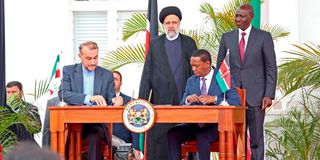
Foreign and Diaspora Affairs Cabinet Secretary Alfred Mutua (right) and his Iranian counterpart Hossein Amir-Abdollahian during the signing of a memorandum of understanding at State House, Nairobi, on July 12, 2023. Looking on are President William Ruto and his Iranian counterpart Ebrahim Raisi.
“From our perspective, trading with Iran and Russian allies potentially creates a reputation risk and also a financial risk such that we are having a direct conversation about those risks that are associated with the expansion of economic relationship. This is a conversation not only are we having here but frankly having with countries around the world and we know that clearly is what Russia and Iran are seeking,” Mr Nelson told Nation.Africa in an interview last year.
Western powers
The US and other Western powers are locked in a protracted proxy war with Russia which invaded Ukraine in 2022.
Members of the North Atlantic Treaty Organisation (Nato), including the US, have been supplying arms to Ukraine. On the other hand, Russia and Iran’s alliance has deepened since the invasion of Ukraine with Tehran backing Moscow.
Russian President Vladimir Putin said yesterday that Iranian President Raisi made “invaluable” contributions to the relationship between Russia and Iran, as he expressed condolences over his death.
The timing of the US officials’ visits to Nairobi last year also coincided with Russia’s hosting of over 17 African leaders for a summit in which Moscow pledged “free Russian grain to replace Ukrainian grain”.
While responding to questions by journalists as to whether the visit to Nairobi by President Raisi would jeopardise the relations between Kenya and US, Mr Nelson had cautioned against having close ties with Iran.
Washington has been wary of Iranian-backed militia deploying air defence weapons to eastern Syria, a development likely to jeopardise the US-led international coalition fighting to defeat ISIS.
“For a long time we are very concerned about Al Shabaab activities in the region. We are taking a number of actions. Recently, while in Mogadishu, Somalia, we announced new sanctions on a senior ISIS-Somalia financier. This action demonstrates US support for our partners in their efforts to counter terrorism financing and strengthen national and regional security,” Mr Nelson had explained.
President Raisi’s visit to Kenya was the third by an Iranian President. President Hashemi Rafsanjani was the first Iranian president to visit Kenya as part of a six-nation African tour in 1996.
In 2009, then Iranian President Mahmoud Ahmadinejad visited Nairobi for talks with President Mwai Kibaki. Prior to the visit, then Kenyan Trade Minister Uhuru Kenyatta, who later succeeded President Kibaki, had led a powerful Kenyan delegation to Tehran to lay the ground for the trade negotiations.
And the visit by the Iranian leader is not the only issue that has sparked controversy— Nairobi has in the past clashed with Tehran over the imprisonment of two Iranians convicted of terrorism charges and who were later released mysteriously from Kamiti Maximum Prison.
It is a fight that the Kenyan Government took all the way to the Supreme Court.
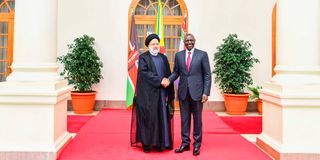
President William Ruto with Iranian President Ebrahim Raisi during the State Visit at State House, Nairobi on July 12, 2023.
The State on October 26, 2018, had cited public interest while lodging the petition asking the Supreme Court to overturn the Court of Appeal’s decision to free the two who had been accused of plotting attacks on the US and Israeli interests in Kenya.
The two Iranian nationals, Ahmad Abolfathi Mohammed and Sayed Mansour Mousavi, had come to Kenya on June 12, 2012, on a tourist/business survey visa.
Upon arrival at JKIA, they had taken a flight to Mombasa and checked in at the Royal Castle Hotel where they had been booked for 10 days by the Teheran Golfers Travel Agency.
They, however, checked out of that hotel on June 16, 2012, after five days and flew to Nairobi where they stayed at the Laico Regency for three days.
Anti-Terrorist Police Unit
On June 19, 2012, while on their way to the airport to catch a return flight back to their country, they were arrested by the Anti-Terrorist Police Unit on allegations of having come to Kenya on a terrorist mission.
The suspects were later charged before the Chief Magistrate’s Court in Nairobi with three offences, including being in possession of 15kgs of the highly explosive chemical, RDX.
They were convicted and sentenced to life imprisonment on the first count, 10 years on the second count and a 15- year jail term on the third count. The sentences were to run concurrently.
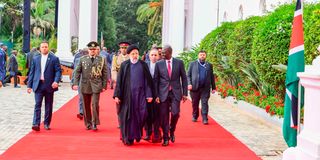
President William Ruto with Iranian President Ebrahim Raisi during the State Visit at State House, Nairobi on July 12, 2023.
The Iranian convicts appealed the verdict at the High Court, which upheld the conviction. The court, however, allowed their appeal against the life sentence, arguing that it was excessive. Consequently, the judge set aside that sentence and substituted it with a composite term of 15 years.
The convicts moved to the Court of Appeal, which quashed their conviction and set aside the sentence. This is the decision which provoked the appeal by the State.
“This is a unique judgment. It has broken new ground in a matter certified as raising matters of great public interest as stated elsewhere above. By it, we have clarified issues that should guide lower courts in the discharge of their mandate in determining criminal cases,” stated the Supreme Court’s verdict on March 15, 2019.
The top judges allowed the State’s appeal, upheld the conviction of the terrorists and ruled that they “shall serve the remainder of their imprisonment term after which they shall be repatriated to their country.”
While in prison, there was a botched plot to facilitate their escape that was linked to an Iranian ambassador.
However, the two were later released mysteriously from Kamiti Maximum Security Prison in 2022.
[email protected]@ke.nationmedia.com


